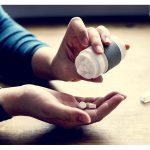
Many young Americans are prescribed psychiatric drugs to treat medical conditions, but nearly one-third of them wind up misusing the medications, a new study finds. “Misuse of prescription substances is alarmingly high among U.S. youth and young adults,” said lead researcher Israel Agaku, a part-time lecturer in oral health policy and epidemiology at the Harvard School of Dental Medicine, in Boston. The study found that, overall, 35% of young people (aged 12 to 25) said they had taken a prescribed psychoactive drug in the past year, and 31% of those said they had misused that drug. While opioids were the most commonly prescribed drug, misuse of stimulants and tranquilizers was higher. Psychotropic drugs change a person’s mental state and can have intoxicating effects. “This study draws attention to the silent epidemic of prescription stimulant use among youth,” Agaku said. “With increasing popularity of performance-enhancing stimulants in schools, it is imperative for policymakers, school administrators, health care professionals and parents to become more aware of this emerging danger and take appropriate steps, similar to what has been done for the opioid epidemic.” Dr. Scott Krakower, an attending psychiatrist in child and adolescent psychiatry at Zucker Hillside Hospital in Glen Oaks, N.Y., said, “It is very alarming to see so many young people having access to controlled substances.” It is important for doctors to screen for illicit… read on > read on >
























-300x200.jpg)










